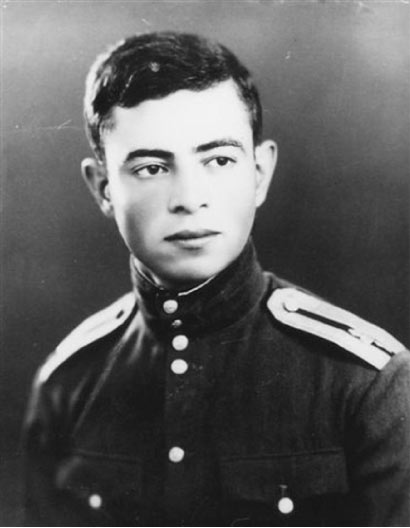Of Arms and the Man
Born in 1917, Sassan Tabatabai’s grandfather was a lifelong military man, serving in the Iranian army until the Islamic revolution of 1979. But as Tabatabai would later learn, the late Assadollah Tayefeh Mohajer was a gifted writer as well as a soldier.

Sassan Tabatabai’s grandfather, Assadollah Tayefeh Mohajer, as a young soldier.
Mohajer ascended to the rank of major general before he escaped the Ayatollah Khomeini regime, and he later relocated with his extended family to Atlanta, where he lived out the rest of his days. Many of his compatriots were not as fortunate. Even some of those who managed to escape to Europe were hunted down and assassinated.
When Mohajer died of a stroke in 1995, he willed his eldest grandchild a sheaf of handwritten papers, including poems, memoirs, and correspondence composed in elegant Persian script on everything from legal pads to Post-it Notes. Now Tabatabai—who is a lecturer in Persian in the Department of Modern Languages & Comparative Literature, a humanities instructor in the Core Curriculum, and poetry editor of The Republic of Letters—is deep into the task of transcribing, translating, and annotating the collection’s 300 pages, which is as much a labor of love as it is the body of a doctoral thesis.
This doctorate, in Editorial Studies, will be the second for Tabatabai, who was in his teens when his family fled Iran, first to Germany and then to the U.S.
With degrees in political science, international relations, and communication, as well as Persian literature and history, Tabatabai has achieved prominence as a translator of classical Persian verse—and also as a poet in his own right. Tabatabai shared a special kinship with Mohajer. “My grandfather knew I liked literature and trusted me to understand his references to classical poetry,” he says.
Mohajer’s memoirs recount significant family events, some of which are set in Iran’s mountainous Kurdish north. From these documents, Tabatabai learned the story of his mother’s birth in a frigid army outpost and how the region’s lone midwife was brought on horseback to deliver the child. He also discovered details of Mohajer’s education as a baby-faced military cadet, his deep love for his homeland, and the indignation that he felt toward the Islamic Republic.
In addition to the insight that they offer into Mohajer’s personal experiences and those of his family, the documents he left behind serve as a record of nearly a century of Iranian history. Among the writings are passages relating the occupation of northern Iran by Soviet forces after World War II, and the subsequent struggle that led to the restoration of Iranian sovereignty in the area.
Mohajer never showed his writings to anyone. “He wrote it all for himself,” Tabatabai says, opening a folder to reveal a series of brief entries, as well as exquisitely penned lines of verse in the classical Persian form. “I’m trying to figure out what’s a fragment and what’s a complete poem.”
Tabatabai believes, however, that his grandfather intended his memoirs to be published someday. “He even gave the work a title: Memoirs of an Unknown Soldier.”
In “Caspian Summer,” a poem from Tabatabai’s own collection, Uzunburun, published by The Pen & Anvil Press, he writes:
Strange, that as autumn leaves
bruise in New England, I can still
taste the air of a Caspian summer,
heavy with humidity and salt.
Strange, that as time thickens, the distance
between us shrinks.
Thanks to the collection of manuscripts he inherited and their shared love of the written word, the same might be said for Tabatabai and his grandfather.